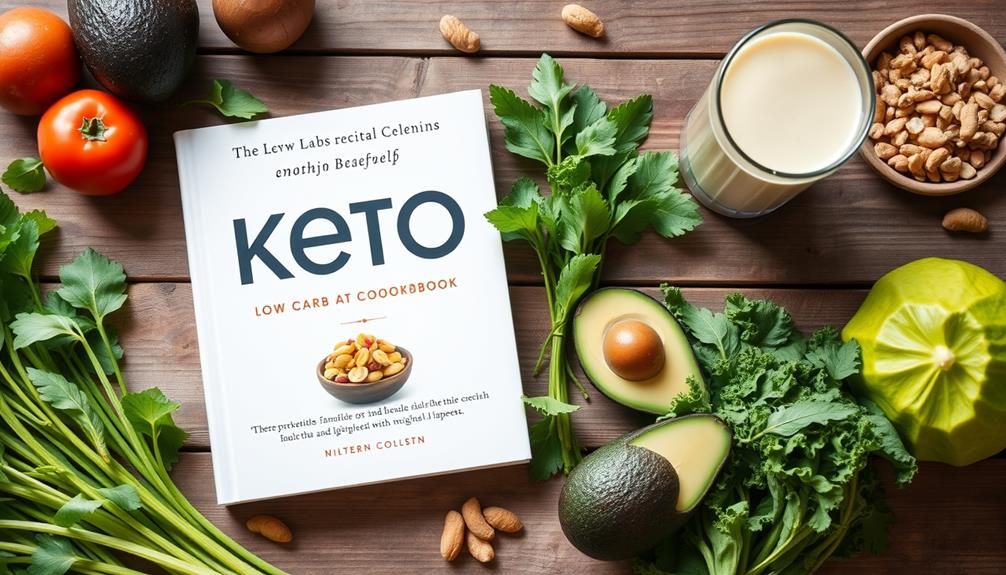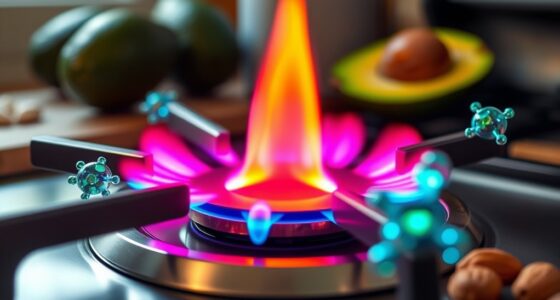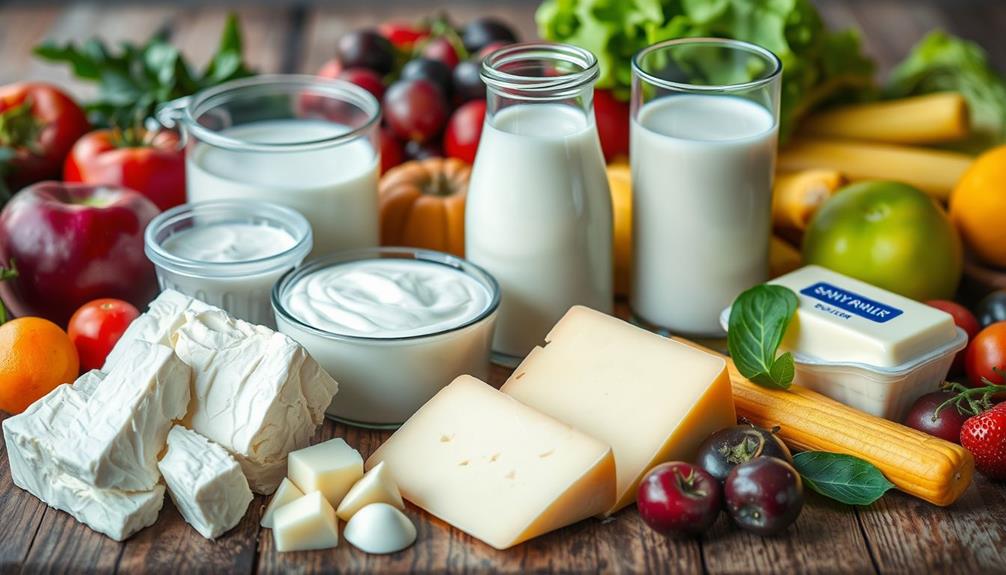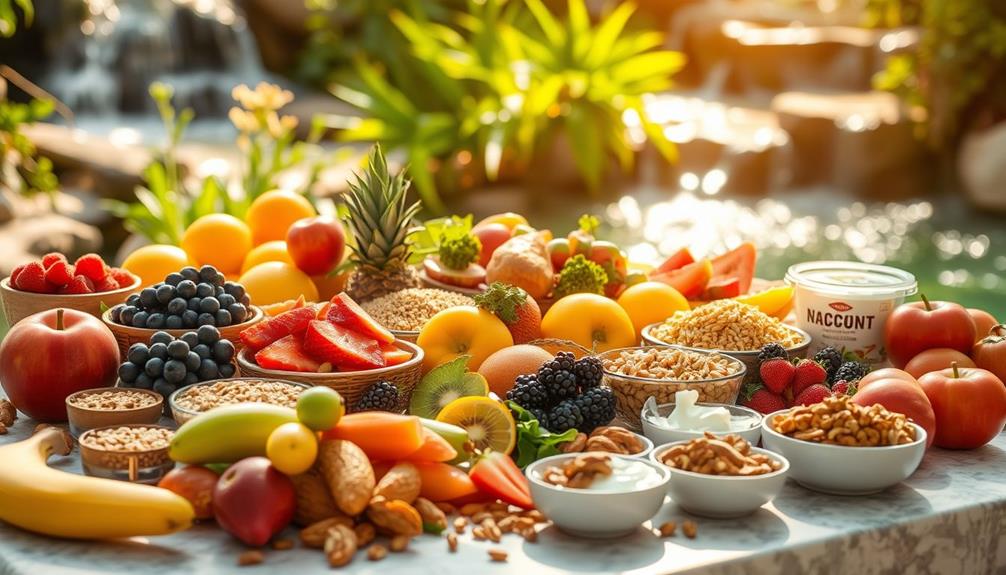To prevent gallstones on a keto diet, focus on healthy fats, stay hydrated, and maintain consistent meal timing. Incorporate foods like avocados, olive oil, and nuts to promote regular bile release, avoiding trans fats and processed oils. Aim for 8-10 cups of water daily to prevent concentrated bile. Establish a routine with smaller meals to ease gallbladder strain, and consider intermittent fasting to optimize bile production. Regular exercise and monitoring your body's reactions to different foods will help. There's so much more to explore about keeping your gallbladder healthy while enjoying a keto lifestyle.
Key Takeaways
- Incorporate healthy fats like avocados, olive oil, and nuts to stimulate bile flow and prevent cholesterol gallstones.
- Stay hydrated by drinking 8-10 cups of water daily to ensure proper bile consistency and digestion.
- Establish a consistent meal schedule with smaller portions to enhance gallbladder function and bile release.
- Consider intermittent fasting to give the gallbladder and liver time to rest and optimize bile production.
- Monitor symptoms and adjust fat intake gradually while consulting a healthcare provider for persistent issues.
Understanding Gallbladder Function

The gallbladder plays an essential role in your digestive system by storing and concentrating bile, which is fundamental for breaking down fats and absorbing vitamins A, D, E, and K. When you eat, especially if your diet is high in fats, your gallbladder releases bile into your small intestine. This bile emulsifies fats, making them easier to digest and absorb.
A solid understanding of common financial terms can aid in planning your dietary expenses effectively. If your gallbladder isn't functioning well, you might experience symptoms like abdominal pain on the right side, bloating, indigestion, and nausea due to reduced bile flow.
It's important to maintain your gallbladder health through regular check-ups. Neglecting this can lead to complications, including gallstones, which can happen when bile becomes overly concentrated.
Understanding your gallbladder's function helps you appreciate the significance of dietary fat. When you follow a ketogenic diet, the increased fat intake stimulates bile production, promoting effective fat digestion.
Causes of Gallstone Formation
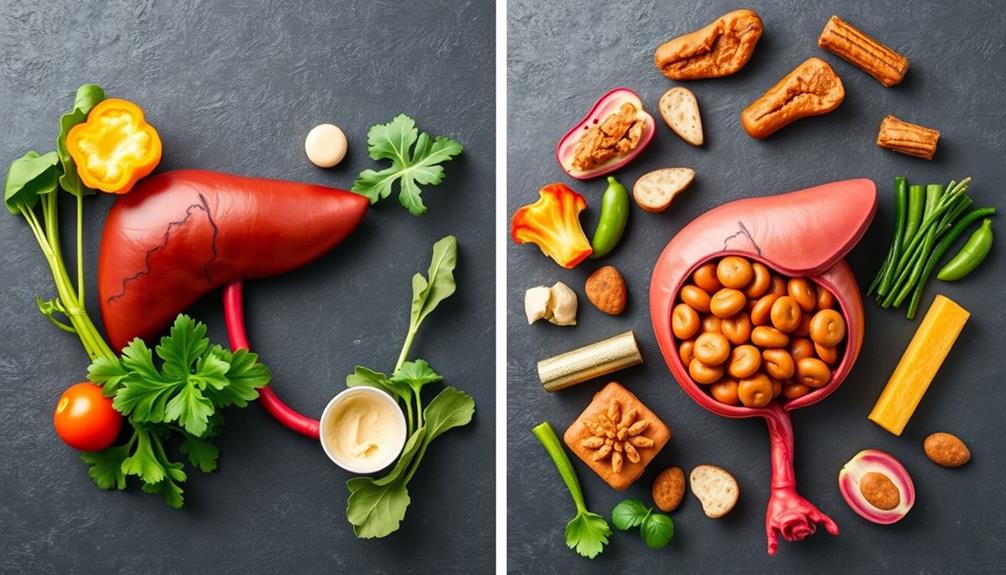
Gallstones form primarily when there's excess cholesterol and not enough bile to break it down, leading to cholesterol saturation in your gallbladder.
If your gallbladder isn't active—often due to low-fat diets—it can't release bile effectively, increasing the risk of gallstone formation.
Additionally, certain dietary choices, such as an excess of high-oxalate foods, may contribute to gallstone risk, similar to how juice diets can lead to nutrient deficiencies.
Understanding these factors can help you make better dietary choices to avoid complications.
Cholesterol Saturation and Bile
Cholesterol saturation often leads to the formation of cholesterol gallstones, which are the most common type. This occurs when there's too much cholesterol in your bile, and insufficient bile salts fail to dissolve it properly. As a result, the excess cholesterol crystallizes, forming gallstones.
To help prevent cholesterol saturation and maintain healthy bile dynamics, consider these tips:
- Incorporate healthy fats: High-fat diets, like keto, can encourage regular bile release, reducing the chance of cholesterol buildup. Additionally, understanding the role of cold medications in maintaining overall health can be beneficial.
- Stay hydrated: Drinking water aids digestion and helps guarantee your bile remains fluid.
- Monitor meal frequency: Eating at regular intervals can enhance gallbladder activity, promoting bile flow.
- Limit processed foods: These can contribute to imbalanced bile composition and increase cholesterol saturation.
Gallbladder Inactivity Risks
Gallbladder Inactivity Risks (Causes of Gallstone Formation)
Inactivity of the gallbladder greatly heightens the risk of gallstone formation, as it hampers regular bile release. When your gallbladder isn't functioning effectively, bile can become saturated with cholesterol, leading to gallstones. This can be particularly concerning for those on a high-fat diet, like the ketogenic diet, where the gallbladder must work harder to digest fats.
Incorporating certain vital oils, such as eucalyptus oil, may support overall digestive health and enhance gallbladder function. A low-fat diet may seem like a good idea, but it contributes to gallbladder inactivity by reducing the stimulation needed for bile production.
Furthermore, prolonged fasting can lead to decreased gallbladder activity, which diminishes bile movement. This stagnation can increase the likelihood of gallbladder problems.
To combat these risks, it's crucial to maintain a balanced intake of healthy fats. Regular consumption of saturated fats can trigger the gallbladder to release bile, promoting its activity and potentially lowering your risk of gallstones.
Adopting a well-structured keto diet not only supports weight loss but also guarantees your gallbladder remains active, helping to prevent complications associated with gallstones. Keep your gallbladder engaged, and your body will thank you!
Keto Diet Overview

The ketogenic diet is all about cutting carbs and increasing healthy fats, which pushes your body into ketosis for fat-burning.
By focusing on high-fat foods and minimizing processed sugars, you not only boost your energy but also support gallbladder health.
Additionally, understanding the importance of diversification of retirement portfolio can provide a holistic approach to health, encompassing both physical and financial well-being.
Understanding these fundamentals can help you enjoy the benefits while keeping gallstones at bay.
Keto Diet Fundamentals
Here's the revised content for your article subheading:
A ketogenic diet's primary focus is on drastically reducing carbohydrate intake while increasing healthy fats. Typically, this means consuming around 70-75% fats, 20-25% protein, and only 5-10% carbohydrates.
By following this approach, your body shifts from burning carbs for energy to burning fat, which can aid in weight loss and enhance metabolic health. This diet can also promote overall health if combined with effective strategies for weight loss.
Here are some key components of the keto diet:
- Healthy fats: Emphasize foods like avocados, nuts, seeds, and healthy oils.
- Limited carbs: Avoid refined sugars, grains, and starchy vegetables.
- Protein source: Include fatty fish and moderate amounts of meat.
- Bile production: High fat intake promotes regular bile release from the gallbladder, essential for fat digestion.
Benefits for Gallbladder Health
Understanding the ketogenic diet's emphasis on healthy fats not only supports weight loss but also offers significant benefits for gallbladder health. By promoting a high fat diet, you encourage regular bile release, which improves gallbladder function and reduces the risk of gallstone formation. Research indicates that those on a keto diet experience a lower incidence of gallstones thanks to frequent bile usage that helps flush out potential stones.
Additionally, intermittent fasting, often paired with keto, can concentrate bile and enhance fat breakdown, further lowering gallstone risk. Incorporating fiber-rich vegetables into your meals supports digestive health, aiding in regular bowel movements and preventing constipation, which is beneficial for gallbladder function.
Here's a quick comparison of how the keto diet supports gallbladder health:
| Benefit | Description |
|---|---|
| Regular Bile Release | Helps prevent gallstone formation |
| Fat-Soluble Vitamin Absorption | guarantees adequate nutrient intake |
| Improved Digestion | Supports overall digestive health |
| Reduced Risk of Gallbladder Disease | Lowers the incidence of gallstones |
Dietary Fats and Gallstone Prevention

Incorporating dietary fats into your ketogenic diet can play an integral role in preventing gallstones. A high intake of healthy fats promotes regular bile release, which is vital for preventing cholesterol gallstones by avoiding bile stagnation.
Additionally, understanding potential risks associated with dietary choices can help you make informed decisions about your health. By including healthy fats, like avocados, olive oil, and nuts, you can support your gallbladder function and enhance bile production, while also considering risk management strategies for your overall health.
To make the most of your dietary fat intake, consider the following tips:
- Gradually increase your fat consumption to stimulate bile flow.
- Focus on healthy fats while avoiding trans fats and processed oils.
- Monitor your body's response to high-fat foods to prevent weight gain.
- Choose a variety of fat sources to guarantee a balanced intake.
Studies show that a higher fat intake may actually decrease gallstone formation, challenging the old belief that fat consumption increases risk.
Importance of Hydration

Maintaining proper hydration is essential for supporting gallbladder function, especially on a ketogenic diet. When you stay adequately hydrated, you help maintain the consistency of bile, which is fundamental for preventing gallstones. Incorporating gentle stretching before bedtime can also aid in relaxation, making it easier to prioritize hydration.
Aim for 8-10 cups of water daily to keep bile from becoming too concentrated, reducing your risk of gallstone formation.
Don't forget that herbal teas can also contribute to your hydration, but be cautious with caffeine and alcohol, as they might impair gallbladder function. Proper hydration aids digestion and nutrient absorption, which is important when you're consuming a high-fat diet.
Yoga for back pain can also highlight the importance of relaxation and overall wellness in managing bodily functions.
Monitoring your hydration levels is key. Dehydration can exacerbate gallbladder issues and hinder bile flow, making it even more important to drink enough fluids.
By prioritizing hydration, you're not only supporting your gallbladder but also enhancing overall digestive health. Remember, the more you focus on staying hydrated, the better equipped your body will be to process fats effectively and minimize the risk of gallstones.
Meal Timing and Frequency

Establishing a consistent meal schedule can greatly enhance your gallbladder health on a ketogenic diet. Regular meal timing supports a healthy digestive rhythm, which promotes consistent bile release and helps reduce the risk of gallstone formation.
Additionally, the power of imagination can play a role in setting realistic meal goals and adhering to them. Instead of large meals, try smaller, more frequent meals to lessen the strain on your gallbladder and improve bile flow.
Here are some tips to contemplate:
- Eat at the same time each day to establish a routine.
- Focus on smaller portions to prevent gallbladder overload.
- Avoid late-night eating to optimize bile release during the day.
- Monitor your body's responses to meal timing adjustments.
Intermittent Fasting Benefits

Embracing intermittent fasting can be a game-changer for your gallbladder health on a ketogenic diet. This approach allows your gallbladder and liver to rest, concentrating bile and improving fat breakdown efficiency, which may lower your risk of gallstones.
By creating extended periods without food, intermittent fasting promotes regular bile release during your eating windows, helping to prevent bile from becoming stagnant and forming gallstones. Additionally, key domains of development in psychology highlight the importance of environmental interactions and lifestyle choices in overall health, which can be reflected in dietary habits.
Research shows that intermittent fasting can enhance metabolic health, leading to better hormonal balance. This is vital since high estrogen and insulin levels can contribute to gallstone formation.
Additionally, strategically timing your meals through intermittent fasting can optimize your digestive health, reducing the likelihood of discomfort and gallstone-related symptoms.
When you combine intermittent fasting with a ketogenic diet, your body becomes more adept at utilizing fats effectively, further supporting gallbladder function and minimizing gallstone risk.
Monitoring Symptoms and Adjustments
Monitoring your symptoms while on a ketogenic diet is essential for ensuring your gallbladder remains healthy. By keeping an eye on how your body responds to dietary changes, you can make necessary adjustments to promote better digestive health.
Here are some key points to reflect on:
- Keep a food diary to identify any dietary triggers related to gallbladder symptoms.
- Regularly monitor symptoms like bloating, abdominal pain, and nausea for insights into your diet's effectiveness.
- Gradually adjust your fat intake to avoid discomfort; opt for healthy fats like avocados and olive oil.
- Note your meal timing and frequency to optimize bile release and enhance digestion.
If you notice persistent issues, don't hesitate to consult with a healthcare provider. They may recommend supplements like bile salts to help with fat digestion and support gallbladder health.
Lifestyle Changes for Prevention

To keep your gallbladder healthy while on a ketogenic diet, adopting specific lifestyle changes can make a significant difference.
Start by incorporating a balanced intake of healthy fats, like avocados and olive oil, to promote regular bile flow and help prevent gallstone formation. Regular physical activity is essential, so aim for at least 150 minutes of exercise each week to support your gallbladder function and reduce the risk of gallstones.
Maintaining consistent meal timing and frequency is another key factor. Opt for smaller, more frequent meals to alleviate strain on your gallbladder and encourage bile release. Staying hydrated is equally important; drink 8-10 cups of water daily to support bile consistency and overall digestive health.
Lastly, keep an eye on your hormonal levels, particularly estrogen and insulin, as imbalances can lead to gallstone formation. Make necessary lifestyle adjustments to keep these hormones in check.
Frequently Asked Questions
How Do I Protect My Gallbladder on Keto?
To protect your gallbladder on keto, incorporate healthy fats gradually, stay hydrated, eat smaller meals, and include fiber-rich vegetables. This approach helps maintain bile flow and supports overall gallbladder health. Listen to your body's signals.
How Do You Prevent Stones on Keto?
Imagine your body's harmony disrupted by discomfort. To prevent stones on keto, you need to gradually increase healthy fats, stay hydrated, and consider intermittent fasting—these steps help your gallbladder thrive while you enjoy your diet.
How to Not Get Gallstones While Fasting?
To avoid gallstones while fasting, stay hydrated, gradually increase fat intake, and monitor your body's reactions. Incorporating healthy fats can stimulate gallbladder contractions, ensuring bile flows and reducing the risk of stone formation.
How Can I Prevent Gallstones From Rapid Weight Loss?
To prevent gallstones from rapid weight loss, focus on gradual weight loss, maintain consistent gallbladder function, incorporate healthy fats into your meals, and engage in regular physical activity. Consult a healthcare provider for personalized guidance.
Conclusion
Incorporating clever culinary choices can help you dodge gallstones while on a keto diet. By focusing on fabulous fats, staying hydrated, and timing your meals wisely, you're setting yourself up for success. Don't forget the benefits of intermittent fasting to fuel your body's fat-burning furnace. Stay vigilant and listen to your body's signals; it's all about balance. With these simple strategies, you can savor your keto journey and sidestep gallstone grief!

